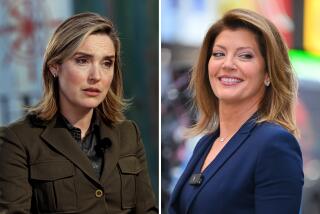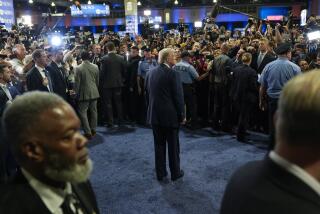Crowley’s anticipated moderation causing anxiety in both campaigns
- Share via
WILLIAMSBURG, Va. -- Tuesday night’s presidential debate may have the look of a town hall, with voters surrounding the candidates and posing the questions, but the degree to which it is a casual conversation between candidates and voters or a tough grilling on the issues is largely up to one woman: Candy Crowley.
The CNN anchor and debate moderator appears to have caused some anxiety within both campaigns with her comments about how she plans to approach her role in the second debate. Crowley has said in repeated interviews that she plans to ask follow-up questions and press candidates on issues they may have conveniently have left out of the answers.
Time Magazine’s Mark Halperin writes that the Obama and Romney campaign feel Crowley’s views conflict with an agreement about debate mechanics worked out between the two parties, which states that the moderator’s role should be limited. Halperin later released the agreement in its entirety, which can be read here.
“In managing the two-minute comment periods, the moderator will not rephrase the question or open a new topic … The moderator will not ask follow-up questions or comment on either the questions asked by the audience or the answers of the candidates during the debate or otherwise intervene in the debate except to acknowledge the questioners from the audience or enforce the time limits, and invite candidate comments during the two-minute response period,” the memo said, according to Time.
PHOTOS: Memorable presidential debate moments
While this may have been the agreement worked out between the campaigns, it is not something signed by Crowley or the Commission on Presidential Debates. Asked last week about whether Crowley has agreed to any terms, a commission official said she had broad discretion on how to run the debate. Other than the basic format – the two-minute time allotment for each answer, rebuttal and discussion --“we’ve not given any restrictions to the moderator,” said Peter Eyre, a senior advisor to the commission.
The Obama campaign didn’t deny the Time report on Monday.
“I’m not going to get into the specifics of the negotiations,” campaign spokeswoman Jen Psaki told reporters in Virginia, where the president is preparing for the debate. “But, obviously this is a town hall, which means the questions will be coming from the American people in the audience. But if the questions come from other sources, he’s happy to address those questions as well.”
The voters in the audience may do the questioning, but there’s no doubt Crowley is running the show. Not only may she ask follow-up questions, she determines which questions get asked.
Participating voters will be asked to submit questions to her Tuesday, Eyre said. Crowley then weeds through them and decides which voters to call on. The voters don’t know in advance if their question will be picked.
“The campaigns don’t know ahead of time, the participants will not know ahead of time,” he said.
[For the Record, 1:09 p.m. PST Oct. 15: This post has been updated to include the full memorandum of understanding between the Obama and Romney campaigns.]
Follow Politics Now on Twitter and Facebook
Twitter: @khennessey
More to Read
Get the L.A. Times Politics newsletter
Deeply reported insights into legislation, politics and policy from Sacramento, Washington and beyond. In your inbox three times per week.
You may occasionally receive promotional content from the Los Angeles Times.











